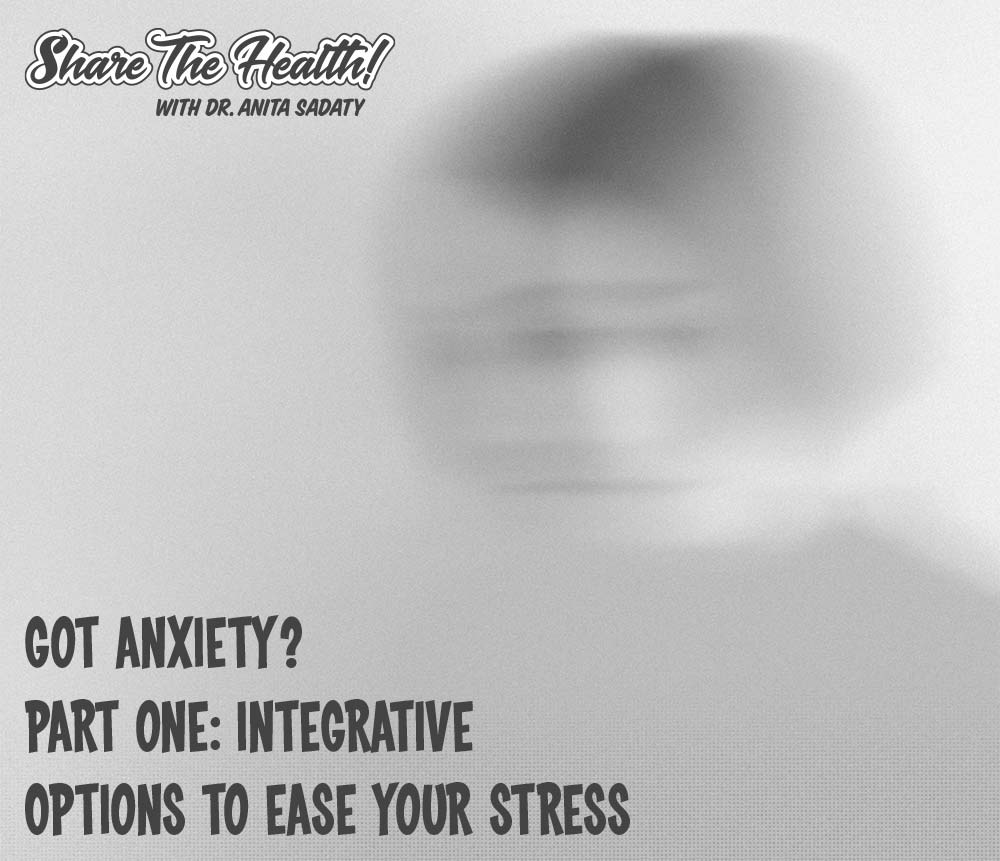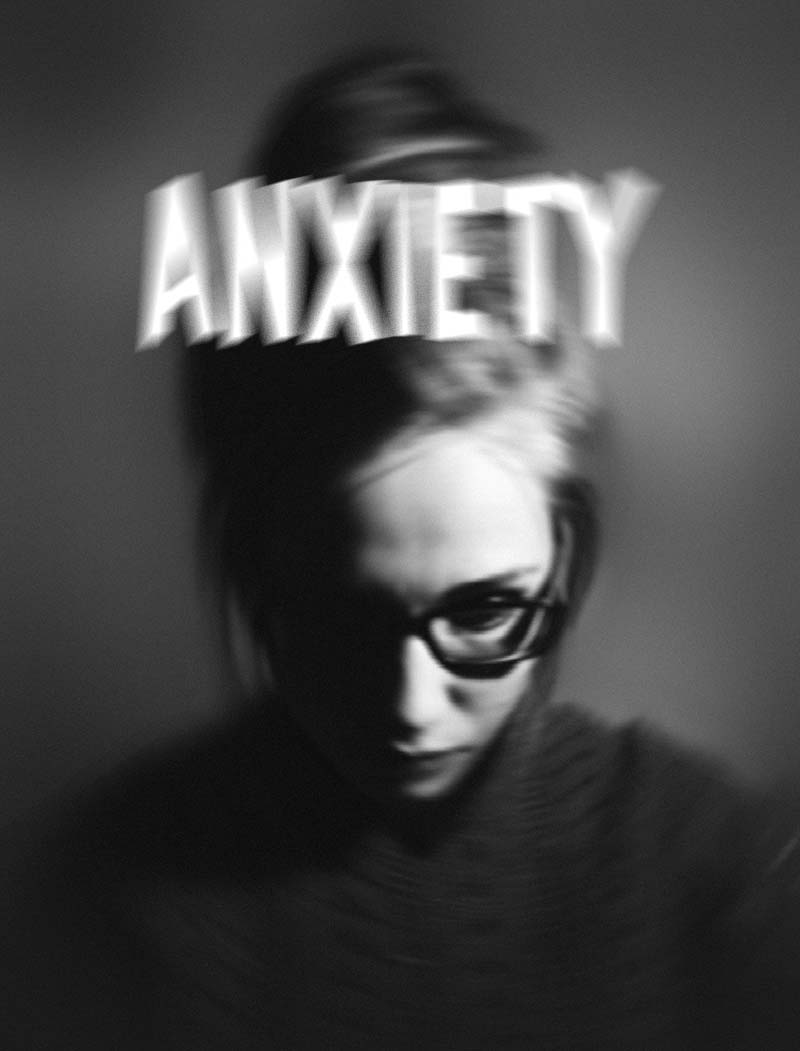
Got Anxiety? Part One
Let’s Discuss Integrative Options To Ease Your Stress
Most of us know what it feels like to occasionally experience feelings of panic and alarm. Brief moments of stress related to “where’s my cell phone?” or “did I miss my flight by a whole day?” Or the terror moments of “I can’t find my seven year-old on a crowded beach!!” or that time when your children, unbeknownst to you, decide to play hide-and-go seek in the local Target and you had no idea where they were despite screaming their names at the top of your lungs…Ah, memories.
Experiencing occasional anxiety is a normal part of life. But those with anxiety “disorders” can experience intense, excessive and persistent worry about everyday situations. This can involve episodes of sudden intense anxiety, fear and actual terror that reaches a peak within minutes – aka panic attacks.
What are some anxiety symptoms?
- Feeling uneasy and irritable
- Sleep disturbances (difficulty falling asleep or staying asleep)
- Headaches
- High blood pressure
- Racing heart or palpitations
- Chest tightness
- Shortness of breath
- Chronic stomach pain or diarrhea and constipation
For some, these feelings of anxiety and panic not only interfere with day to day activities, but are difficult to control and are out of proportion to the actual danger. This can lead to avoiding places or situations to prevent these feelings.

Some studies estimate that a whopping 18% of the US population are affected by anxiety disorders. I see these unusual levels of anxiety very often in my patient population. This era of the pandemic and associated media doom and gloom messaging bombarding us day-in and day-out have served to drastically increase levels of anxiety disorder in all age groups. Sadly, many affected individuals are on the pharmaceutical gravy train of addictive benzodiazepines to ease that pain. Understandably, patients who come in with anxiety and mental health concerns don’t want to feel better in a week or a month. They want to feel better yesterday and these medications can, in the short term, rapidly relieve these symptoms.
Why is this of concern? Long term use of anxiolytic medications (the Xanaxes, Valiums and Klonopins of the world) have been linked to increased risks of dementia and mental decline. This is not okay. Even less addictive anti-anxiety medications (like SSRIs – Prozac, Zoloft, and Lexapro, for example) can cause withdrawal symptoms when patients attempt to eventually get off of them. Using medications exclusively also neglects searching for underlying causes of anxiety and mood disorders.
An Integrative Approach To Anxiety
First of all, what I love about an integrative approach is that it is highly personalized to the person who is experiencing distressing levels of stress and anxiety. It’s not a blanket “here’s your blue pill, have a nice day!” approach.
It definitely takes a village to treat and manage anxiety disorder. A multi-disciplinary approach should ideally involve a team of professionals to address the underlying causes of anxiety:
- A well trained therapist to address the psychosocial causes of stress and anxiety. Ideally, someone familiar with cognitive behavioral therapy techniques. In this article, 9 CBT techniques for better mental health “The key principle behind CBT is that your thought patterns affect your emotions, which, in turn, can affect your behaviors. CBT highlights how negative thoughts can lead to negative feelings and actions. If you reframe your thoughts in a more positive way, it can lead to more positive feelings and helpful behaviors.”
- A health care provider who looks for physical and physiologic causes underlying anxiety. Your brain is a physical organ. When mental health issues arise, it is not always “just” about stress. Even if stress is an immediate cause, the impact of stress on your body can leave a lasting mark and prevent resolution of the anxiety response back to a normal state.
- A medical doctor trained in the effective personalized prescribing of psychotropic medications.
- A health and lifestyle coach to examine ways to alleviate triggers and stressors that elevate stress reactions.

Start with a complete picture of your patient: Medical history and lifestyle factors
This is a critical piece. This helps you prioritize how to move forward. Important questions to ask include:
- Family history of mood disorders (genetic tendencies)
- Head trauma or head injury (brain inflammation)
- Prior history of sexual or physical abuse or PTSD
- Social history: relationships, jobs, family, recent travel or change of residence
- Medical illnesses or diagnosed medical conditions
- Current prescription and OTC medication and recreational drug use
- Recent illnesses, antibiotic use, surgeries
- Pregnancy history
- For women, are you premenopausal, post menopausal or post partum?
- 3 day diet journal to identify current nutrition
- Smoking, alcohol and caffeine use
- Sleep and exercise patterns
- Work and home/life details
- Current life stressors or struggles
Lab Testing For Anxiety
Although there is no diagnostic lab test for anxiety, I typically examine three basic areas of function that can lead to mood disorders.
➀ Nutrient status – many vitamin and mineral depletions are related to an increased risk of anxiety and depression symptoms
➁ Hormone status – Imbalances in various hormone systems can influence mood.
➔ Sex hormones like estrogen, progesterone, testostosterone,
➔ Thyroid hormone levels
➔ Stress hormone levels
➔ Blood sugar and insulin levels
➂ Inflammation status – there is a clear association with inflammation and depression and anxiety. Inflammatory processes in the body can lead to inflammation in the brain.
Basic Blood Panel To Evaluate Anxiety and Depression
A functional medicine doctor will order the following panel. Importantly, you want to make sure that your levels are in the optimal zone and not just squeaking into normal.
- Complete blood count (CBC) – to look for anemia, iron and b vitamin status
- Ferritin – iron storage testing
- Serum B12, B6 and folate – vitamins needed for adequate production of feel good neurotransmitters like Dopamine and Serotonin
- Homocysteine – a marker for cellular B12 or folate deficiency
- Serum Vitamin D – a hormone that is linked to depression and anxiety when low
- Magnesium – a mineral that is widely involved in reducing stress and anxiety
- Plasma Zinc
- Day 21 estrogen, progesterone, testosterone
- AM cortisol and DHEA
- Thyroid functions testing (expanded panel)
- Fasting glucose, HgA1c and insulin
- hsCRP and ESR – markers of inflammation in the body
Don’t Forget The Gut!!! The Gut Brain Axis
Butterflies in your stomach? Pit in your stomach? The unplanned bout of diarrhea when you are stressed or anxious? Not pooping for a week? Heartburn symptoms when deadlines approach? There is a definite connection between the health of your gut and your brain. This is called the gut-brain axis.
Abnormal gut bacteria definitely impact neurotransmitter production and the absorption of nutrients that influence mood. Remember that 90% of serotonin, the feel good brain chemical, is made in your gut. Don’t forget, the relationship between the gut and the brain isn’t a one way street. That communication happens in both directions. Your state of mind can impact your gut and what’s happening in your gut will impact your brain.
Being in a calm, controlled, balanced state of mind means that your parasympathetic, rest and digest nervous system is working. This allows for digestion, normal bowel movements, excellent absorption of nutrients and an overall well functioning intestinal tract. Stress, anxiety, and general feelings of overwhelm will trigger your sympathetic, fight or flight nervous system. The gut basically shuts down and stops working properly. A chronic state of fight or flight will even change the bacterial balance within 24 hours.
Oftentimes fixing gut imbalances will have dramatic effects on your level of anxiety and depression.
So, there is a lot to consider…
Stay tuned for Got Anxiety Part 2: The 4 R Gut Restoration Program
Please Share the Health if you liked what you read!!!
For more information about my wellness programs and my practice, check out my website drsadaty.com. Hey Look! You are already here…
Ready for the legal disclaimer? Information offered here is for educational purposes only and does not constitute medical advice. As with any health recommendations, please contact your doctor to be sure any changes you wish to consider are safe for you!
This is a comprehensive approach that is long overdue.
Thank you Dr. Schneider for the kind words!